Time tracking software: compare the best time tracking systems & tools
Managing people and projects can be challenging, especially in a fast-paced business landscape. Time tracking software is essential for businesses of all sizes to streamline operations and maximize productivity. Whether you’re tracking billable hours, managing projects, or optimizing resource allocation, the right time tracking tool can make a significant difference.
Article outline
What is a time tracking software and how does it work?
Time tracking software features to look for
Benefits of time tracking tools and systems
Time Tracking integrations
Best time tracking software at a glance
Getting to know different time tracking software tools
1. DeskTime
2. Toggl Track
3. Harvest
4. Clockify
5. TimeCamp
6. Hubstaff
7. RescueTime
8. ClickTime
9. QuickBooks Time
10. Everhour
11. Beebole
More useful time tracking tools
Free time tracking software
Benefits of time tracking tools and systems
Time tracking software for employees of large enterprises or organizations
Time tracking software for small businesses
How to adapt time tracking software into daily workflow: tips & tricks
Frequently asked questions
What is a time tracking software and how does it work?
Time tracking software is a digital tool that allows individuals and businesses to monitor and record the time spent on various tasks and projects. It helps with managing work hours, improving productivity, and ensuring accurate billing and payroll. These tools are essential for freelancers, remote workers, and teams to track their efficiency, allocate resources effectively, and generate detailed reports for clients or internal review. Time tracking software can operate both online and offline, allowing users to track time without an internet connection and sync data once reconnected.
Time tracking software features to look for
- Ease of Use: The software should have an intuitive interface that’s easy for all team members to navigate.
- Multi-Platform Compatibility: Ensure it works across different devices and operating systems (desktop, mobile, web).
- Integration Capabilities: Look for tools that integrate with other software like project management, accounting, and communication apps.
- Reporting and Analytics: Comprehensive reporting features to analyze time usage and productivity.
- Billing and Invoicing: Automatic generation of invoices based on tracked hours.
- Customization: Ability to customize the software to fit your specific workflow and business needs.
- Real-Time Tracking: Track work hours in real time with a timer feature.
- Timesheet: Enter time in a weekly timesheet for easy overview and management.
- Calendar: Visually block out and manage time using calendar integration.
- Auto Tracker: Track apps and websites you use automatically.
Benefits of time tracking tools and systems
Time tracking tools offer numerous benefits for both individuals and organizations. They enhance productivity by providing detailed insights into how time is spent, allowing for better task prioritization and resource allocation. Accurate time tracking ensures precise billing and payroll management, reducing errors and disputes. These tools also facilitate project management by helping track progress against deadlines and budgets. Additionally, time tracking systems can improve accountability among team members, as everyone is aware of their time commitments and contributions.

Time tracking integrations
Modern time tracking software often comes with extensive integration capabilities, allowing it to seamlessly connect with other essential business tools. This includes integration with project management platforms like Asana and Trello, accounting software such as QuickBooks and Xero, and communication tools like Slack and Microsoft Teams. These integrations enable streamlined workflows by automatically syncing data across different systems, reducing the need for manual entry and minimizing the risk of errors. Effective integration ensures that all business operations are cohesive and efficient, providing a more holistic view of project and team performance.
Best time tracking software at a glance
To help you choose the best time tracking software, we’ve compared the core features of the most popular tools in the market.
Key Criteria for Comparing Time Tracking Software
In this review, we evaluate time tracking software based on key features such as ease of use, integration capabilities, automation, reporting functions, and pricing to ensure that the tools meet diverse business needs. We aim to help users navigate the vast array of time tracking software options by comparing essential features and integrations, highlighting user reviews, and assessing pricing structures. By doing so, we make it easier to select the best solution tailored to your team’s workflow, budget, and operational requirements.
What You Should Consider
When selecting time tracking software, it’s important to assess several key factors to ensure the tool is suitable for your specific needs. These include:
- Fit for Your Team Type: Whether your team is remote, in-house, or hybrid, the software should accommodate your working environment. For remote teams, features like automatic time tracking, productivity reports, and a mobile-friendly app are essential. In-house teams might benefit more from advanced scheduling and task management functionalities.
- Price: Compare pricing models to ensure the software fits your budget. Watch for extra costs associated with added users, advanced features, or premium support.
- Integration with Daily Workflow: The tool should integrate seamlessly with your team’s current workflow. Look for software that easily connects with your existing project management, invoicing, or communication platforms, helping improve productivity without adding complexity.
By evaluating these factors, you’ll select a time tracking tool that fits your team’s unique setup and enhances daily operations.
Tip 1: Choose a tool that feels comfortable and enhances
your productivity. It should streamline your tasks and integrate smoothly into your daily routine. A good time tracking tool will be your day-to-day ally, so select one that helps you work smarter, not harder.
| Time Tracking App | Automatic time tracking | Manual time tracking | Reporting | Task management | Free plan | Pricing | Ratings |
| DeskTime | ✔ | ✔ | ✔ | ✔ | ✔ | From $7/user per month | 4.6 |
| Toggl Track | ✔ | ✔ | ✔ | ✔ | ✔ | From $10/user per month | 4.7 |
| Harvest | ✔ | ✔ | ✔ | ✔ | ✔ | From $10/user per month | 4.6 |
| Clockify | ✔ | ✔ | ✔ | ✔ | ✔ | From $9.99/user per month | 4.7 |
| TimeCamp | ✔ | ✔ | ✔ | ✔ | ✔ | From $7/user per month | 4.7 |
| Hubstaff | ✔ | ✔ | ✔ | ✔ | ✔ | From $7/user per month | 4.5 |
| RescueTime | ✔ | – | ✔ | – | ✔ | From $9/user per month | 4.6 |
| ClickTime | ✔ | ✔ | ✔ | ✔ | – | From $12/user per month | 4.6 |
QuickBooks Time | ✔ | ✔ | ✔ | ✔ | – | From $25/user per month | 4.7 |
| Everhour | ✔ | ✔ | ✔ | ✔ | ✔ | From $7/month | 4.7 |
| Beebole | ✔ | ✔ | ✔ | ✔ | – | From $9.99/user per month | 4.5 |
Getting to know different time tracking software tools
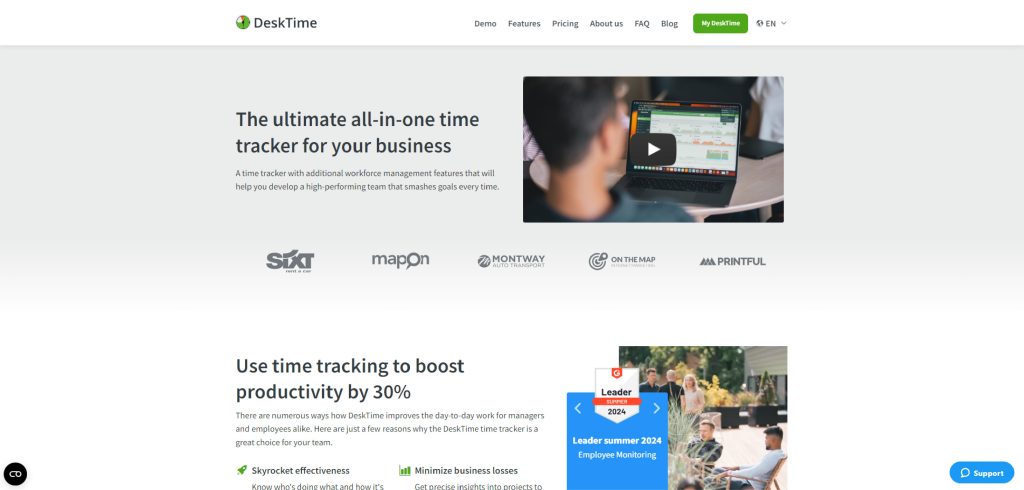
1. DeskTime
DeskTime provides comprehensive time tracking and productivity analysis tools designed to enhance business efficiency. With its user-friendly interface and robust features, DeskTime helps businesses optimize their workflows and maximize productivity while prioritizing employee well-being. By offering insights into work habits and patterns, DeskTime empowers organizations to foster a healthy work-life balance and create a positive work environment.
Capterra rating: 4.6
Free plan: Yes, with limited features.
Main features: Automatic time tracking, customizable productivity reports, project tracking.
Main integrations: DeskTime integrates with the most popular project management tools, including Google Calendar, Outlook Calendar, Trello, Asana, and Jira, and with countless other apps through Zapier.
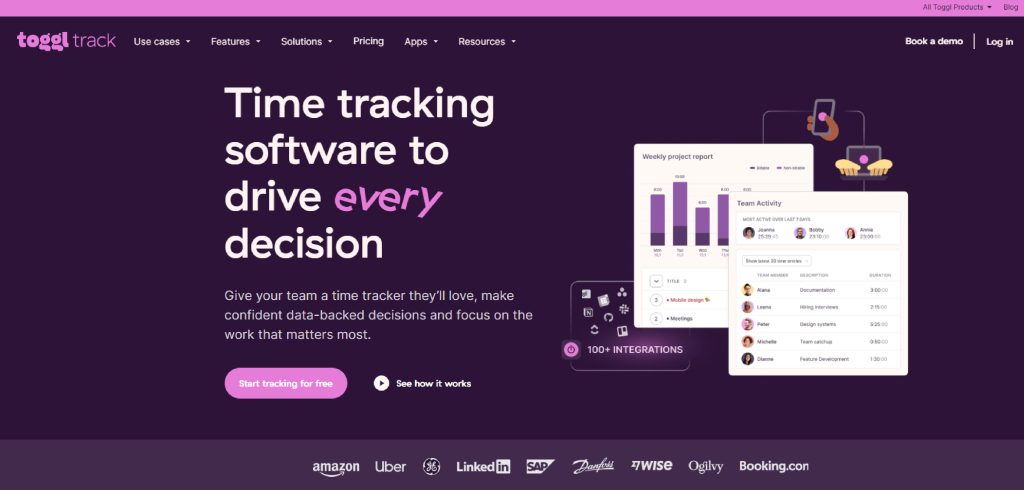
2. Toggl Track
Toggl Tracking offers intuitive time tracking solutions with a user-friendly interface and powerful features to enhance productivity. Its seamless integration with various popular tools ensures smooth workflow management for users across different platforms and applications.
Rating: 4.7
Free plan: Yes, with limited features.
Main features: One-click time tracking, customizable reports, project tracking.
Main integrations: Slack, Asana, Trello, and Google Calendar.
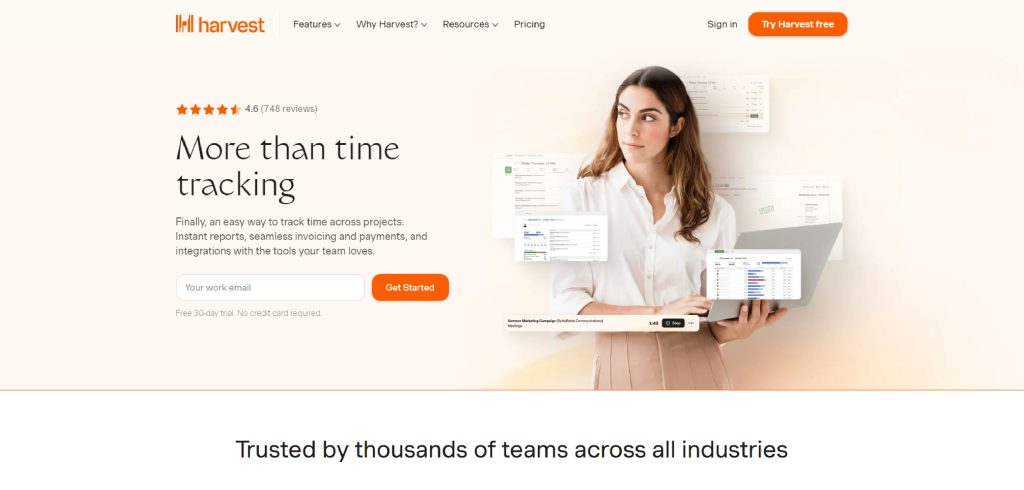
3. Harvest
Harvest provides time tracking and invoicing software designed to streamline project management and billing processes for businesses of all sizes. With its robust reporting capabilities and customizable invoicing features, Harvest empowers businesses to gain valuable insights into their projects and finances, ultimately improving efficiency and profitability.
Capterra rating: 4.6
Free plan: Doesn’t offer a free plan.
Main features: Time tracking, expense tracking, project budgeting, invoicing capabilities.
Main integrations: Harvest integrates with popular apps like QuickBooks, Xero, Slack, and Basecamp.
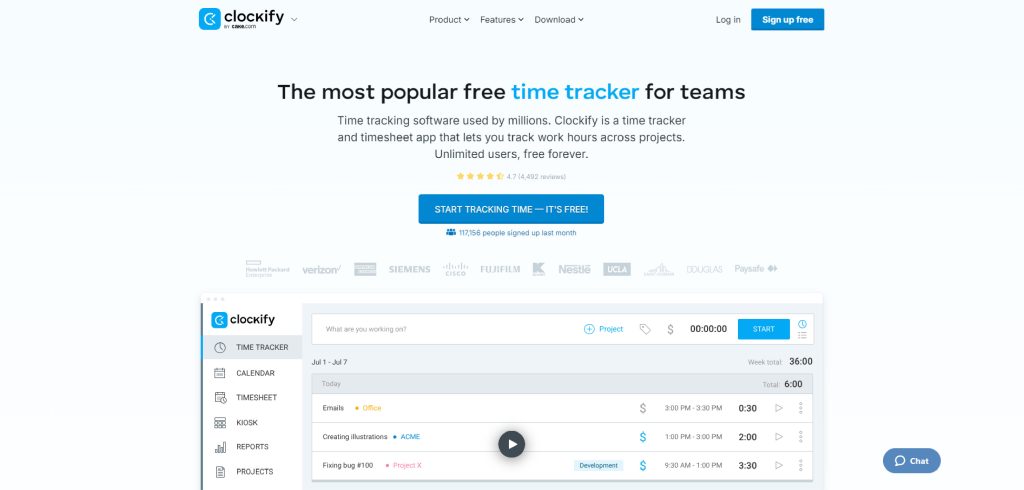
4. Clockify
Clockify offers basic free time tracking software with unlimited users and projects, allowing teams to track time efficiently. Its user-friendly interface and extensive reporting tools allow teams to identify areas for improvement and optimize their workflows. With Clockify, businesses can enhance productivity and accountability across all levels of their organization.
Capterra rating: 4.7
Free plan: Yes, with limited features.
Main features: Manual time tracking, reporting, timesheet approvals.
Main integrations: Clockify integrates with apps like Slack, Trello, Asana, and Google Calendar.
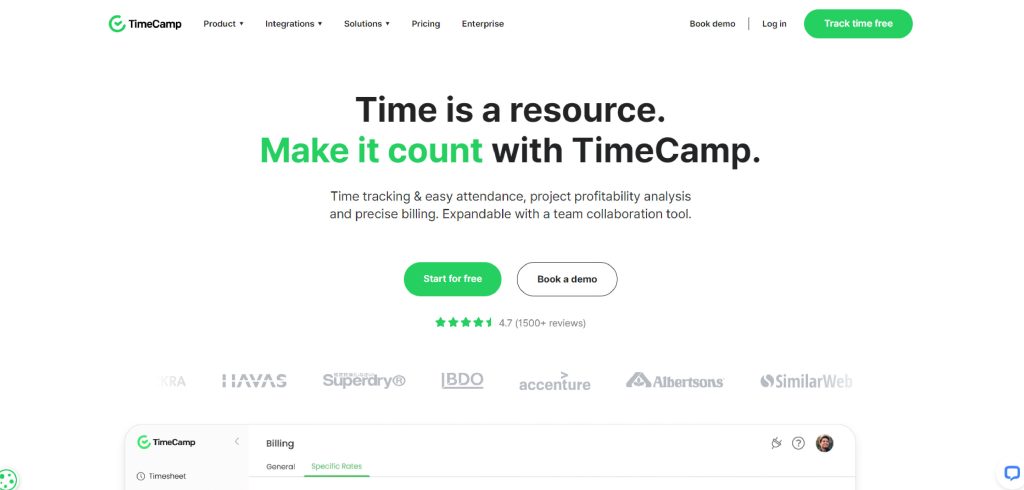
5. TimeCamp
TimeCamp provides time tracking and project management software with automatic time tracking and budgeting features. Its interface and customizable reporting options make it easy for teams to monitor their progress and make data-driven decisions. With TimeCamp, businesses can streamline their project workflows and effectively manage resources to meet deadlines and achieve their goals.
Capterra Rating: 4.7
Free Plan: Yes, with limited features.
Main Features: Automatic time tracking, timesheets, invoicing, project budgeting.
Main Integrations: TimeCamp integrates with tools like Asana, Trello, Slack, and Zapier.
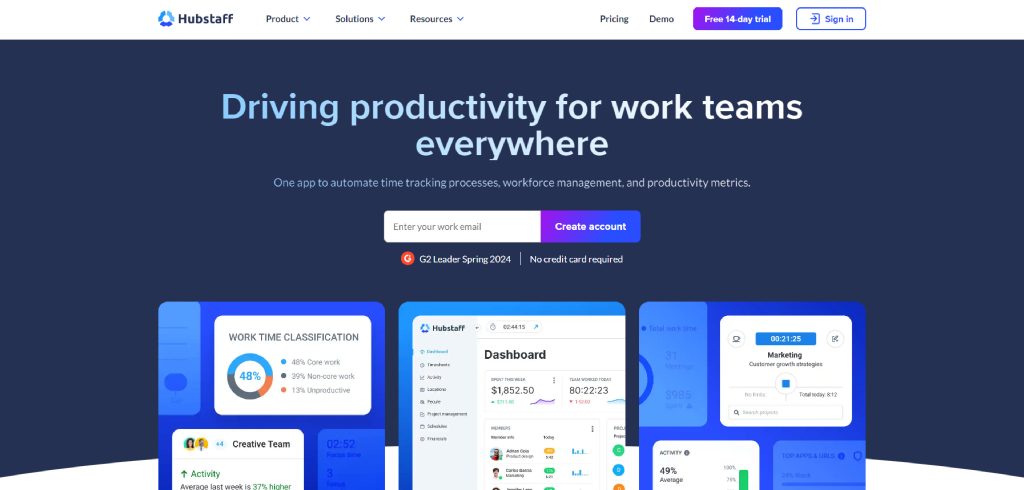
6. Hubstaff
Hubstaff offers time tracking and team management software with GPS tracking and online timesheets to monitor and manage remote teams effectively. Its advanced reporting features provide detailed insights into employee productivity and project progress, allowing managers to make informed decisions and optimize workflows.
Capterra Rating: 4.5
Free Plan: Doesn’t offer a free plan.
Main Features: GPS tracking, online timesheets, employee monitoring, payroll integrations.
Main Integrations: Hubstaff integrates with tools like Trello, Asana, Slack, and QuickBooks.
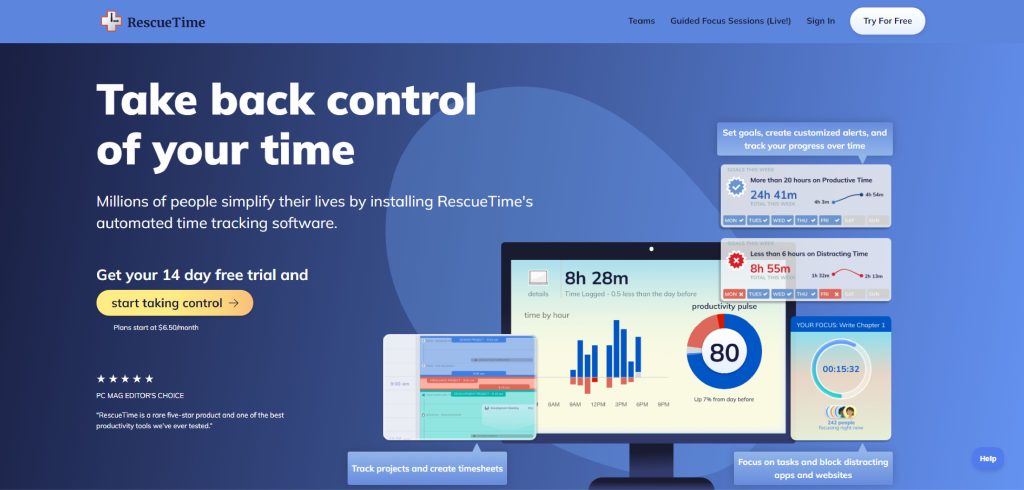
7. RescueTime
RescueTime offers automatic time tracking software to improve productivity and focus. It helps users understand and optimize their digital habits by providing detailed insights into daily activities and time usage. This enables users to identify patterns, set goals, and make informed decisions about their work habits.
Capterra Rating: 4.6
Free Plan: Yes, with limited features.
Main Features: Automatic time tracking, productivity analysis, distraction blocking.
Main Integrations: RescueTime integrates with tools like Trello, Asana, Slack, and Google Calendar, offering insights and recommendations to enhance productivity and time management.
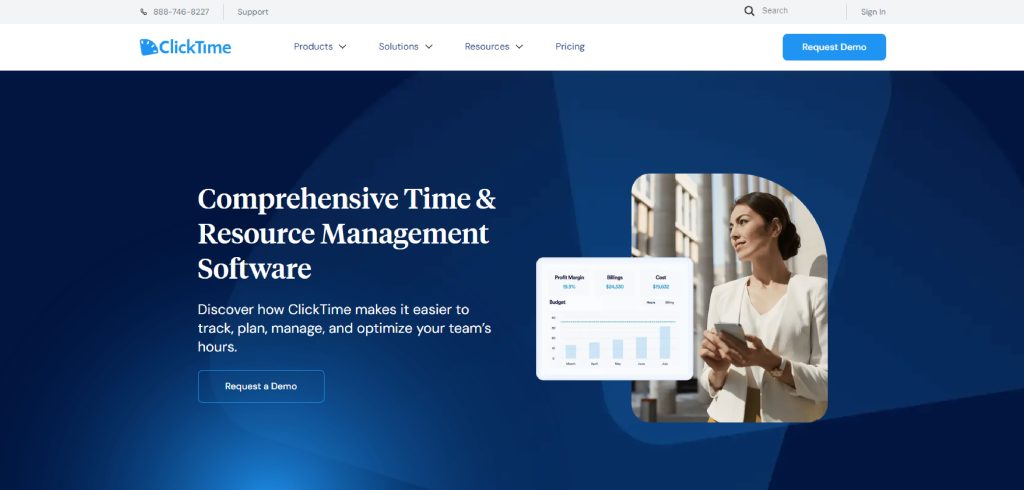
8. ClickTime
ClickTime provides time and expense tracking software with powerful reporting and budgeting features to help businesses streamline project management and financial processes. Its advanced analytics tools allow for real-time tracking of project costs and resource allocation, enabling organizations to make data-driven decisions and optimize their budgets effectively.
Capterra rating: 4.6
Free plan: Doesn’t offer a free plan.
Main features: Time tracking, expense tracking, reporting, budgeting.
Main integrations: ClickTime integrates with popular tools like QuickBooks, Salesforce, NetSuite, and Zendesk.
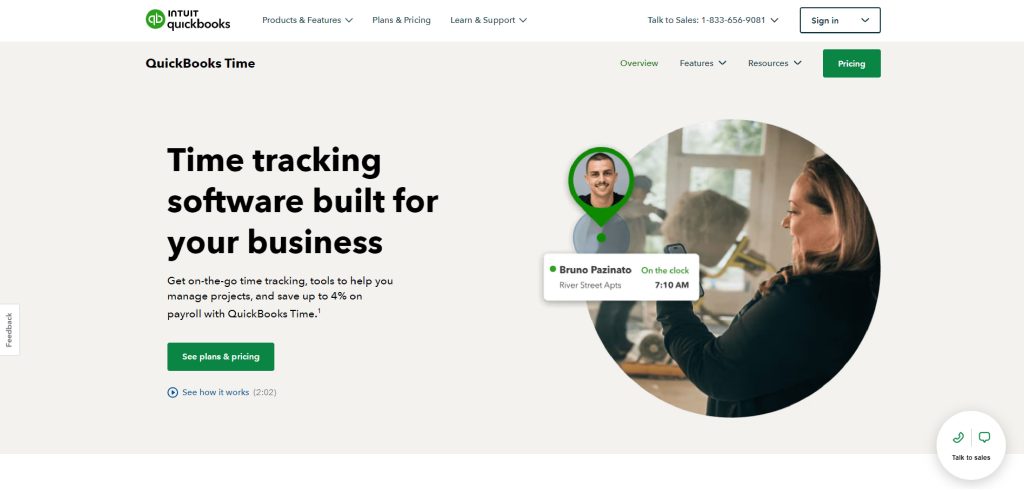
9. QuickBooks Time
QuickBooks Time (formerly known as TSheets) offers time tracking and scheduling software with a mobile app functionality. It allows businesses to track and manage employee time. Its user interface and GPS tracking feature provide visibility into employee locations, facilitating compliance with labor laws and efficient workforce management.
Capterra Rating: 4.7
Free Plan: Doesn’t offer a free plan.
Main Features: Mobile time tracking, detailed reporting, seamless payroll integrations.
Main Integrations: QuickBooks Time integrates with accounting software such as QuickBooks, Xero, Gusto, and ADP.
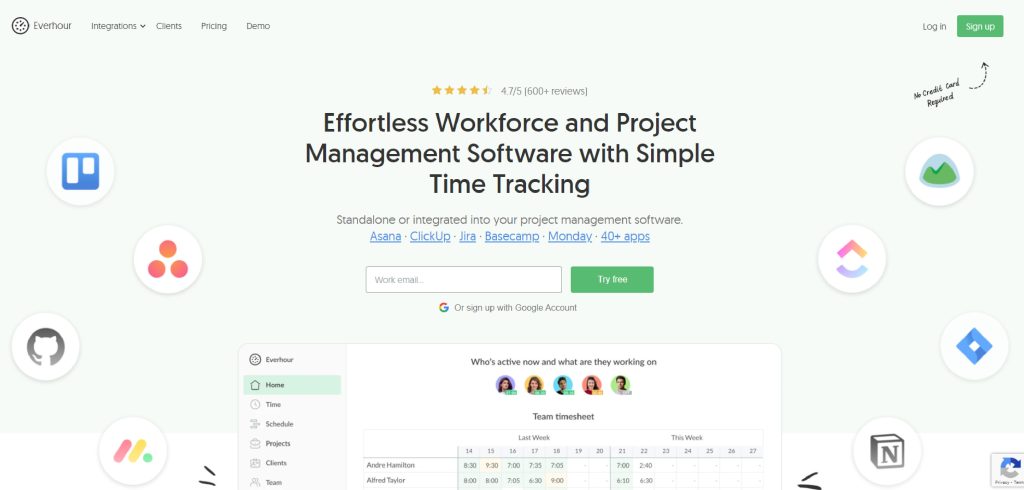
10. Everhour
Everhour provides time tracking and project management software with time tracking and reporting features to help teams track billable hours and manage projects effectively. With Everhour’s reporting capabilities, teams can gain insights into project progress, budget utilization, and team productivity.
Capterra Rating: 4.7
Free Plan: Doesn’t offer a free plan.
Main Features: Time tracking, project management, reporting, invoicing.
Main Integrations: Everhour integrates with tools like Asana, Trello, Basecamp, and Jira.
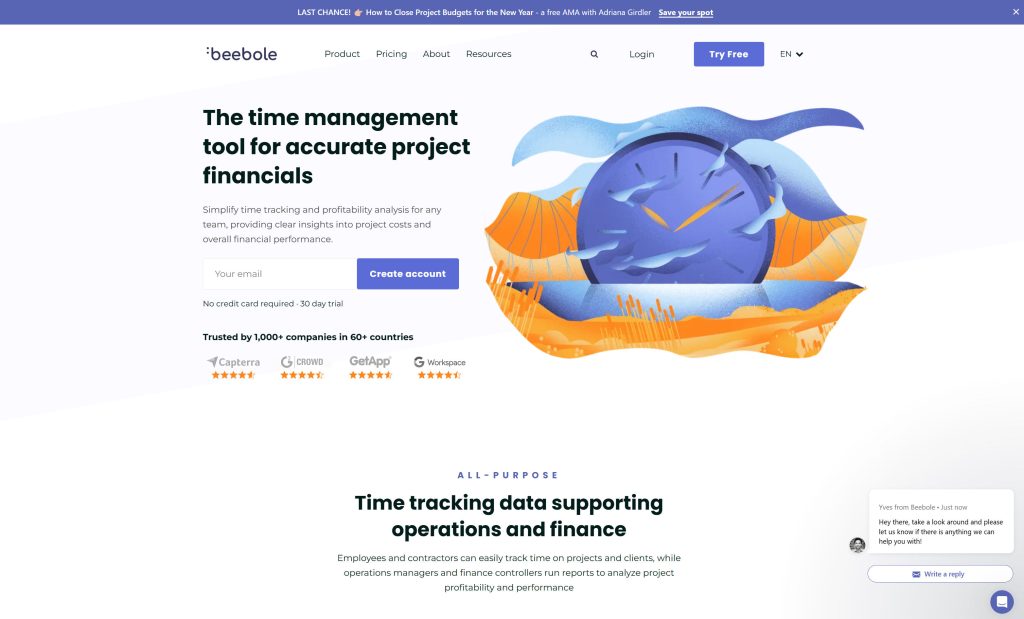
11. Beebole
Beebole is a versatile project time tracking tool tool designed to simplify time tracking and provide powerful project and financial insight. Beebole can be easily customized for teams of all sizes, and it can be used for compliant time tracking, project management, budgeting, reporting & analysis, and much more.
Capterra Rating: 4.6
Free Plan: Doesn’t offer a free plan. A 30-day free trial for new users.
Main Features: Project time tracking, advanced reporting, tracking billable vs. non-billable hours, multiple languages.
Main Integrations: Beebole integrates with various tools, including Google Workspace, Microsoft 365, and more via Zapier, plus it offers an open API
More useful time tracking tools
If you’re looking to explore more options and discover what additional features time tracking tools can offer, consider checking out these tools as well. They provide a variety of useful functionalities beyond basic time tracking, such as advanced reporting, integration with project management software, and mobile access. Each tool is designed to suit different business needs and can significantly enhance productivity and workflow management.
- MyHours
- Timely
- Time Doctor
- Tracking Time
- Paymo
Free time tracking software
We understand that sometimes a free time tracking tool is the best fit, especially when you need basic functionality without committing to a paid plan. While these free options can help track hours and manage simple projects, they often come with limited features. Popular free time tracking tools include Toggl Track, Clockify, and MyHours, each offering free versions with essential functionalities. However, it’s important to carefully review what is included in the free plan. Often, advanced features like detailed reporting, team management, or integration with other software are locked behind a paywall, so be cautious about when charges might start if your needs grow beyond the basics.
Benefits of time tracking software for large organizations
Time tracking is crucial for large enterprises due to the complexity of operations. Implementing a time tracking system provides comprehensive insights into employee productivity, helping managers identify inefficiencies, allocate resources effectively, and optimize project timelines. Additionally, centralized time tracking platforms streamline payroll processing and enhance transparency and accountability.
Tip 2: Feeling overwhelmed with choosing the right tool? If you’re a manager, shortlist a few preferred tools and have your team test them. Their feedback will help you make the right decision.

Time tracking software for small businesses
Small businesses often face resource constraints, making accountability crucial. Time tracking software helps small business owners optimize pricing strategies and improve profitability by accurately tracking billable hours and project expenses. These tools also streamline administrative tasks such as payroll processing and client invoicing, freeing up valuable time for core operations and growth initiatives.
How to adapt time tracking software into daily workflow: tips & tricks
Here are some tips and tricks for adapting time tracking software into your daily workflow:
- Start with a clear plan: Define your objectives and goals for using time tracking software. Determine how it will benefit your workflow and what specific metrics you want to track.
- Choose the right software: Select time tracking software that meets your needs and preferences. Consider factors such as ease of use, features offered, scalability, and pricing options.
- Customize for your workflow: Tailor the software to fit your specific workflow requirements. Adjust settings, project structures, and task categories to align with your work style.
- Encourage adoption: Communicate the benefits of time tracking software to ensure support from all team members. Provide training and support to help everyone onboard and use the software effectively.
- Set clear expectations: Establish guidelines and expectations for how time tracking data will be used and analyzed. Clearly communicate the importance of accurate and consistent time tracking for project management and accountability.
- Provide feedback and coaching: Offer feedback and coaching to team members based on their time tracking data. Use it as a tool for performance evaluation, coaching, and professional development.
- Stay flexible: Be open to adapting your time tracking approach as your business evolves. Stay informed about new features and updates in time tracking software to ensure you are using it to its full potential.
By integrating time tracking software into your daily workflow, you can enhance your team’s productivity and efficiency. Leveraging the features of the best time tracking software available helps manage your team’s time and optimize your workflow.
That’s all from us! Remember—whether you choose a time tracker software with advanced reporting capabilities or a simple time tracking tool, integrating it into your and your team’s daily routine can help you stay organized and focused on achieving your goals. Explore the various time tracking systems out there and find the one that best suits your needs to unlock your full potential and succeed in your endeavors.
Frequently asked questions
What is the best way to track time?
The best way to track time is by using automated time tracking software or apps that provide real-time tracking, reporting, and integrations with project management tools. These solutions minimize manual errors and streamline the tracking process for both individuals and teams.
What is time tracking software?
Time tracking software is a digital tool designed to help users monitor and record the time spent on various tasks or projects. It is commonly used for purposes such as productivity tracking, project management, and billing. Additionally, time tracking software can also refer to an app. Many tools, like DeskTime, offer both desktop versions and mobile apps, making it easy to track time whether you’re at your desk or on the go. This flexibility ensures that you can keep tabs on your time and tasks, no matter your location or device.
What’s the best time tracking software?
The best time tracking software depends on your specific needs. For individuals, look for features like real-time tracking and simple reporting to manage your daily tasks efficiently. For teams, consider tools that offer more advanced options such as project management integrations, team collaboration, and detailed analytics. Automation features and compatibility with your existing workflow are also key factors to ensure seamless tracking. Ultimately, the right time tracking software will depend on whether you’re focusing on personal productivity, client billing, or managing team resources and projects.
What should you look for when choosing a time tracking tool?
When choosing a time tracking tool, consider factors such as ease of use, automation features, reporting capabilities, integration with other software, and pricing. For teams, look for collaboration features and scalability as your business grows.
Is there a free tool to track hours?
Yes, there are free tools to track hours. However, be mindful that free versions often have limited features, with advanced options available through paid plans. Always check what is included in the free version before committing.
Did you find this article useful? Give it a clap!
Psst! You can clap more than once if you really loved it 🙂